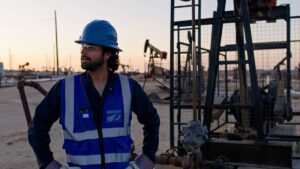Energy Quarterly Wrap: ADX gears up for transformational drilling, Conrad agrees terms for potential gas sales

ADX is preparing for some tasty drilling. Pic: via Getty Images
It’s a wrap for the September quarter. Here are some of the latest highlights from energy-focused ASX small and midcaps on their activities for the three months to the end of September.
Their activities are particularly relevant given the focus on energy security brought about by a combination of geopolitical tensions and years of underinvestment in new sources of oil and gas.
ADX Energy (ASX:ADX)
During the quarter, ADX increased its Austrian oil and gas production by 2% to 324 barrels of oil equivalent per day, taking revenue up 2% to $3.29m thanks to ongoing test production from the Anshof-3 oil well continuing to exceed expectations.
The company is currently preparing to spud the Anshof-2 appraisal well, which targets a thicker reservoir intersection that is expected to deliver higher production rates from the 25km2 mapped Anshof structure.
Engineering, procurement and preparation is also underway to replace the current Anshof early production unit with a permanent facility capable of up to ~3000 barrels of oil per day production capacity.
Separately, the company received a drilling permit and is awaiting environmental clearance to drill the potentially transformational Welchau-1 exploration well that targets a best technical prospective resource of 807 billion cubic feet of gas right smack in the middle of energy hungry Europe.
ADX also secured an investment agreement from MND Austria, which will provide $19m in funding to earn a 30% economic interest in the Anshof oil development, and received ministerial acceptance for its Anshof Investment Agreement documentation that provides proforma documentation framework for future Austrian farmouts and co-investment.
Botala Energy (ASX:BTE)
Botala Energy made significant progress with the Project Pitse commercial pilot program within its Serowe coalbed methane project in Botswana with the successful flaring of gas from the original Serowe-3.1 well.
During the quarter, it also completed drilling of the first of four pilot wells – Serowe-3.2 – on time and on budget with logging indicating that it had intersected 37m of coal within the Serowe, Lower and Upper Morupule seams.
Project Pitse is designed to determine the commercial flow-rate potential within the surrounds of the Serowe-3.1 well and is just one of the planned phases of the proposed Serowe Energy Hub.
In addition, the company raised $1.3m via an institutional placement priced at 9c per share to advance the drilling and flow testing programs.
“This past quarter has seen the commencement of the commercial pilot program, Project Pitse. We are excited about this program because it is the pathway to establish a cluster of wells to underpin development of the commercial potential of the Serowe CBM gas play,” chief executive officer Kris Martinick said.
Conrad Asia Energy (ASX:CRD)
During the quarter, Indonesia-focused gas company Conrad Asia Energy signed a non-binding term sheet with Singapore’s Sembcorp Gas that outlines the core terms that will form the basis for a definitive sales agreement for gas from its Mako project in the West Natuna Sea.
Mako has a resource of 413Bcf of gas and benefits from easy access to existing infrastructure that is already connected and sending gas to Singapore and Malaysia.
The non-binding term sheet bolsters development of the project and supports the company’s plan to sell down some of its 76.5% participating interest in the broader Duyung production sharing contract (PSC), which has seen more interest.
It has also completed two of the three front end engineering design studies for Mako with the third on track for completion by mid-November 2023.
“We are extremely pleased with the progress in the Mako FEED. Tendering of major contracts is ongoing, from which will emerge a revised view of project costs,” managing director Miltos Xynogalas said.
Separately, CRD continues to identify and evaluate options for commercialisation of shallow-water gas discoveries in the recently acquired Offshore North West Aceh and Offshore South West Aceh PSCs.
It is also building a portfolio of leads and prospects in both the deep- and shallow-water areas of the Aceh PSCs and has commissioned a detailed geotechnical study to assess and create an inventory of leads that is expected to be concluded by year end.
Greenvale Energy (ASX:GRV)
GRV is focused on developing its Alpha Torbanite project in Queensland, which seeks to produce high-value bitumen, light crude oil and activated carbon from torbanite – a type of oil shale contained within cannel coal that is distinguished by its high-grade hydrocarbon content.
During the September quarter, the company completed the second phase of drilling aimed at upgrading the current inferred resource of 18.6Mt, which is enough for the production of 21.9 million barrels of synthetic oil equivalent.
It also started the final fourth stage of liquefaction test work that is a key step towards delivery of a pre-feasibility study for the Alpha project.
Separately, an initial feasibility study into the potential for geothermal power generation at GRV’s Longreach project has been completed, which found that CeraPhi Energy’s CeraPhiWell down-hole heat exchanger technology can provide the requisite heat for powering a 4.95MWe plant.
GRV also moved to acquire a 75% interest in EP 145 in the Amadeus Basin in central Australia that hosts best estimate prospective resource of 440 billion cubic feet of natural gas, 26.4Bcf of helium and 26.4Bcf of naturally occurring hydrogen.
Hartshead Resources (ASX:HHR)
Hartshead’s push towards a final investment decision for the Phase 1 development of its UK Southern Gas Basin received further boosts during the September quarter.
The company appointed corporate finance energy sector specialist Carlingford to assist with finalising third party financing and completed a geotechnical survey across the Anning and Somerville fields’ platform and pipeline locations.
It also awarded a contract for a geophysical survey of pipeline routes following a competitive tender and evaluation process with the Gardline vessel “Ocean Observer” was mobilised post-quarter to carry out the survey.
“The Hartshead and RockRose Energy team integration has been very successful and the teams are focussed on progressing to final investment decision (FID), upon receiving no further technical questions from the North Sea Transition Authority,” chief executive officer Chris Lewis said.
“We have seen the UK gas price surge to over £1.50 per therm in the last few weeks and the forward curve for UK gas remains very strong for the many years ahead.
“Our Phase 1 gas project will move into the development phase post taking FID later this year and we are uniquely positioned to help provide new gas supply to the UK.”
Related Topics

UNLOCK INSIGHTS
Discover the untold stories of emerging ASX stocks.
Daily news and expert analysis, it's free to subscribe.
By proceeding, you confirm you understand that we handle personal information in accordance with our Privacy Policy.








